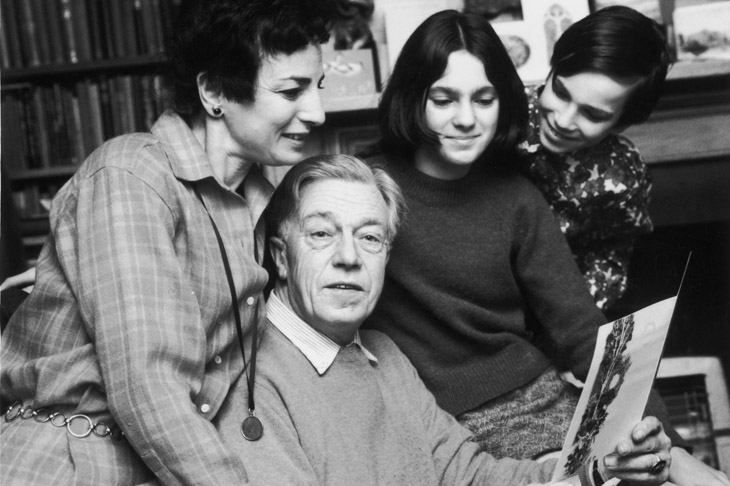Literary reputation can be a fickle old business. Those garlanded during their lifetimes are often quickly forgotten once dead. Yet there is a daily procession of visitors to Keats’s grave in the English cemetery in Rome, where the headstone reads, ‘Here Lies One Whose Name Was Writ in Water’, so sure was the poet that the neglect he had suffered up to his death would continue ever after.
By any standards, C. Day-Lewis — he disliked Cecil, the name given to him by his Church of Ireland vicar father — was among the most glittering figures on the 20th-century British literary scene, celebrated, well-connected, a bestseller and Poet Laureate for the four years up to his death in 1972. Since then, though, he has all but slipped off the radar, save for passing references in articles about his famous son, the triple Oscar-winner Sir Daniel Day-Lewis.
Too derivative, some say of his poetry. Too much in Auden’s shadow, say others. But two distinguished admirers, keen to encourage a resurgence, have collected the best of Day-Lewis’s prose writings in a single elegant volume as The Golden Bridle. The award-winning poet, Bernard O’Donoghue, and Albert Gelpi, the Emeritus Professor of English at Stanford University, are not simply looking back in nostalgia at a man they continue to believe was a major not a minor poet. They also make a persuasive case that Day-Lewis’s thoughtful contributions to the eternal debate on poetry, its purpose and its perfectibility, remain illuminating and highly relevant today.
In simple terms, he believed that poetry must have a place in public debates, even if it meant compromising its much vaunted purity. It was a conviction that began when — alongside Auden, Spender and MacNeice — he was lionised as one of the ‘Poets of the 30s’. Together, they rejected the aloofness from world affairs of the great Modernists of the previous decade, T.S. Eliot and Ezra Pound, and instead incorporated in their verse an appeal for radical economic and political change during a decade that began with a depression and went on to witness the Spanish Civil War as part of the rise of fascism across Europe.
In A Hope for Poetry in 1934, Day-Lewis provided a prose manifesto for this new poetic movement — quoted at length in The Golden Bridle. He unashamedly laid out the case for ‘impure poetry’ — where it was put to political ends:
To the idea of poetry as exclusive, esoteric, amoral, the private affair of the poet, moving in a different world from prose, creative of its own reality, I should oppose the idea of poetry as catholic, diverse in function, moral, everyone’s business (potentially at any rate), assimilating not rejecting prose meaning, a way of synthesising and communicating reality.
If it sounds like an internal argument amongst poets, then it is hard for a modern audience to grasp quite how famous the poets of the 1930s were. Today poetry exists largely in the quieter corners of the Radio 4 schedule and on small stages at specialist events. But 85 years ago, Day-Lewis et al (collectively damned as ‘MacSpaunday’ by one arch critic) were on front pages and shared political platforms with the men of the hour. Indeed, T.E. Lawrence, in a much-reported remark to Winston Churchill in 1934, once called Day-Lewis ‘the one great man in these lands’.
Auden was to tire of ‘political’ poetry. The melancholy conclusion to his great 1939 elegy for W.B. Yeats famously declared that ‘poetry makes nothing happen: it survives/ In the valley of its making where executives/ Would never want to tamper’. Its influence persists to this day. But Day-Lewis disagreed, and never renounced his youthful commitment.
In 1940s Cambridge, 1950s Oxford (as Professor of Poetry, beating C.S. Lewis to the post in an election), and 1960s Harvard, he never tired in his lectures and prose writings of arguing that poetry must be about something bigger than the poet’s life and loves — though there was a fair amount of his love affairs with Rosamond Lehmann, Elizabeth Jane Howard, A.S. Byatt and his second wife, the actress Jill Balcon, in some of the memorable collections he produced in the second half of his life — notably in his raw writings about Lehmann in 1953’s ‘An Italian Visit’:
All woman she was. Brutalising, humanising,
Pure flame, lewd earth was she, imperative
as airAnd weak as water, yes all women to me.
For anyone wanting an elegant, accessible, thought-provoking exploration of poetry and its unique power to change minds as well as hearts, the texts collected here are less a golden bridle and more a gold mine. The jury may be out on whether Day-Lewis was a first- or second-tier poet, but as a critic, thinker and theorist of his craft, he unquestionably belongs at the very top of the tree.






Comments